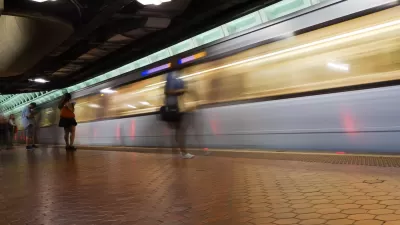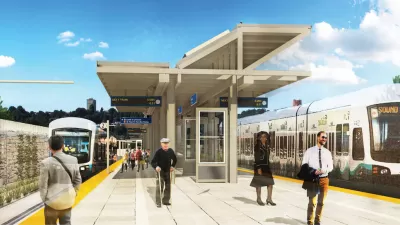King Farm, a 440-acre development in the D.C. suburbs, was designed to be the perfect transit-oriented development, with a light rail to be built later. Now, residents have decided they don't want the transit to ever be built.
It seems that even though King Farm was designed with a light rail right-of-way in mind, residents don't see the need for it, preferring to drive their cars. One resident formed the anti-transit group after realizing that the light rail would pass in front of her house, a fact that she claims she was never made aware of.
Kaid Benfield writes:
"...the thing is, we need the transit to make these big suburban developments work for the larger region's traffic and for the environment. King Farm is not an inner suburb. It's about 10 miles beyond the Capital Beltway [...] and 21.6 miles from NRDC's downtown DC office, according to Google Maps. There's a shuttle to the Metro station, another thing the developer did right, but that only helps if you're going where the Red Line goes, basically only south from the station since it's the end of the line.
For those who live, work or shop along its route, the Transitway will not only make it easier to reach the Metro (or to reach King Farm from the Metro) at more times during the day but also run along more of an east-west route, linking its customers to additional centers of employment and activity."
FULL STORY: Residents of award-winning, transit-oriented development say no to transit

Maui's Vacation Rental Debate Turns Ugly
Verbal attacks, misinformation campaigns and fistfights plague a high-stakes debate to convert thousands of vacation rentals into long-term housing.

Planetizen Federal Action Tracker
A weekly monitor of how Trump’s orders and actions are impacting planners and planning in America.

San Francisco Suspends Traffic Calming Amidst Record Deaths
Citing “a challenging fiscal landscape,” the city will cease the program on the heels of 42 traffic deaths, including 24 pedestrians.

Defunct Pittsburgh Power Plant to Become Residential Tower
A decommissioned steam heat plant will be redeveloped into almost 100 affordable housing units.

Trump Prompts Restructuring of Transportation Research Board in “Unprecedented Overreach”
The TRB has eliminated more than half of its committees including those focused on climate, equity, and cities.

Amtrak Rolls Out New Orleans to Alabama “Mardi Gras” Train
The new service will operate morning and evening departures between Mobile and New Orleans.
Urban Design for Planners 1: Software Tools
This six-course series explores essential urban design concepts using open source software and equips planners with the tools they need to participate fully in the urban design process.
Planning for Universal Design
Learn the tools for implementing Universal Design in planning regulations.
Heyer Gruel & Associates PA
JM Goldson LLC
Custer County Colorado
City of Camden Redevelopment Agency
City of Astoria
Transportation Research & Education Center (TREC) at Portland State University
Jefferson Parish Government
Camden Redevelopment Agency
City of Claremont





























